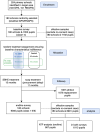The effects of skill-based health education-A randomised-controlled intervention in primary schools in rural Bangladesh
- PMID: 40644507
- PMCID: PMC12250694
- DOI: 10.1371/journal.pone.0327325
The effects of skill-based health education-A randomised-controlled intervention in primary schools in rural Bangladesh
Abstract
This paper evaluates the impact of skill-based health education (SBHE) on children's hygiene practices and health in rural Bangladesh. Over one year, SBHE was delivered weekly to primary schools through a randomised-controlled trial (RCT) by locally recruited trained para-teachers. The SBHE and soap provision interventions, provided in a cross-cutting manner, were randomly assigned to 180 schools stratified by two school types. Data were collected at both the school and child levels, involving 40 students in grades 1-4 at baseline and expanding to 50 students in grades 1-5 at endline, ten students per grade. The study tracked the same pupils, supplemented by additional and replacement students, resulting in effective sample sizes of 7,192 at baseline and 8,992 at endline. The results indicate that SBHE significantly improved hygiene practices; the average treatment effects on overall hygiene practices was 0.22 SD [0.14-0.31] (p < 0.001), and those on health/hygiene knowledge was 0.44 SD [0.33-0.55] (p < 0.001). While improvements in cold-related symptoms among the SBHE school children were marginally significant (-0.05 SD [-0.10, -0.01], p = 0.09), the overall trends indicated general improvement in health as well as healthy behaviours across all schools, irrespective of treatment status. Additional analysis incorporating inter-school spillover effects provided robust evidence of beneficial healthy practice externalities, extending beyond treatment school children. A cross-cutting soap provision treatment, although implemented imperfectly, did not show any standalone positive health-related effects. Nonetheless, our cost-effectiveness analysis indicated the economic viability of SBHE, particularly when accounting for spillover effects. This study is registered in the AEA RCT registry (No.0004265) and the ISRCTN registry (No.18002856).
Copyright: © 2025 Omura et al. This is an open access article distributed under the terms of the Creative Commons Attribution License, which permits unrestricted use, distribution, and reproduction in any medium, provided the original author and source are credited.
Conflict of interest statement
The authors have declared that no competing interests exist.
Figures
References
-
- Bangladesh Directorate General of Health Services. Health Bulletin 2010. Mohakhali Dhaka 1212: Government of the People’s Republic of Bangladesh Ministry of Health and Family Welfare, Directorate General of Health Services; 2010.
-
- Linkon KMdMR, Prodhan UK, Liton Md, Islam MdK, Lisa LA, Paul DK. Prevalence of Contagious Diseases of School Going Children in Bangladesh. JBM. 2015;03(07):17–24. doi: 10.4236/jbm.2015.37003 - DOI
-
- Management Information System, Bangladesh Directorate General of Health Services. Health Bulletin 2020. Government of the People’s Republic of Bangladesh Ministry of Health and Family Welfare; 2022. Available from: https://old.dghs.gov.bd/images/docs/vpr/lhb_2020.pdf
-
- Schools ill-equipped to provide healthy and inclusive learning environments for all children – UNICEF, WHO. 23 Jun 2022. [cited 27 Apr 2024]. Available from: https://www.unicef.org/bangladesh/en/press-releases/schools-ill-equipped...
-
- World Health Organization. Making every school a health-promoting school – Implementation Guidance. 22 Jun 2021. [cited 14 Mar 2023]. Available from: https://www.who.int/publications-detail-redirect/9789240025073
Publication types
MeSH terms
LinkOut - more resources
Full Text Sources


